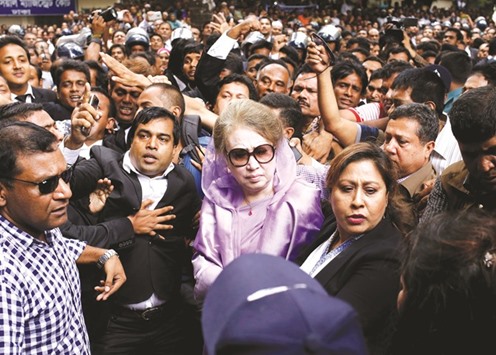Embattled Bangladesh opposition leader Khaleda Zia was granted bail yesterday after she appeared in court on a string of new charges over a deadly transport blockade, a prosecutor said.
Hundreds of her supporters gathered outside the metropolitan sessions court in Dhaka chanting anti-government slogans, as the 70-year-old arrived to seek bail in the nine cases.
“We opposed the bail saying that police have found her involvement in the nine cases.
But the judge granted her bail in all the cases,” Dhaka’s chief prosecutor Abdullah Abu told AFP.
“Although she was granted bail, the court has taken cognisance of all the charges against her,” he added.
The new charges take to 30 the number of cases against the former two-time prime minister, mostly related to alleged violence and graft, her lawyer Masud Ahmed Talukder said.
Her party says the cases have been fabricated and are aimed at keeping Zia, a bitter rival of Prime Minister Sheikh Hasina, under political pressure.
Eight of the new cases relate to the nationwide transport blockade last year orchestrated by Zia’s Bangladesh Nationalist Party (BNP) and its Islamist allies in a failed bid to force Hasina to resign.
The blockade unleashed a wave of bloody violence, leaving about 150 people dead as opposition activists fire-bombed hundreds of buses and trucks and police responded by firing live rounds.
A pro-government lawyer has also filed a new case of sedition against Zia for publically questioning the official death toll during Bangladesh’s war of independence against Pakistan in 1971.
The government says three mn people were killed when then East Pakistan broke away to become Bangladesh.
Independent researchers however say the overall toll was much lower.
Hasina has vowed to prosecute BNP officials for last year’s violence.
Around 15,000 opposition supporters and dozens of senior BNP officials were arrested as part of a crackdown in the wake of the unrest, weakening the party.
Last month, a court sentenced Zia’s eldest son and heir apparent Tarique Rahman to seven years in jail after convicting him over a money laundering case.
Rahman, who lives in exile in London, will be automatically banned from contesting polls unless he surrenders to a Bangladeshi court.
Experts said Hasina could call a general election in 2017, two years ahead of schedule, if Zia is convicted in any of the cases and therefore barred from politics.
Two of her graft cases are in the final stages of hearing.
The BNP boycotted the 2014 general election, leaving the field clear for its rivals.
A former Bangladeshi lawmaker was yesterday sentenced to death for crimes committed during the country’s 1971 war of liberation from Pakistan, court officials said.
A special tribunal handed down the death penalty to Sakhawat Hossain,
a former Bangladesh Jamaat-e-Islami party lawmaker, for the killing,
raping and torturing of unarmed civilians during the war, prosecution lawyer Ziad Al Malum said.
The three-member panel of judges also sentenced seven others, six of them in absentia, to life in prison, the lawyer said.
Hossain was a central committee member of Islami Chhatra Sangha, the student wing of the Jamaat-e-Islami party which opposed the creation of Bangladesh.
It aided the Pakistani army to carry out atrocities against civilians in what was then eastern Pakistan and is now Bangladesh.
Hossain, a local commander in a group that helped Pakistani soldiers in the southwestern district of Jessore, was convicted on five counts of war crimes.
Prime Minister Sheikh Hasina set up the special tribunal in 2010 to prosecute suspected war criminals who collaborated with the Pakistani military.
An earlier initiative to prosecute war crimes was called off after the assassination of Bangladesh’s founding president Bangabandhu Sheikh Mujibur Rahman, Hasina’s father, in a military putsch in 1975.
The tribunal has so far convicted 34 people, including some of Jamaat-e-Islami’s top leaders.
Twenty-one were sentenced to death, 12 to life in prison and one to 90 years in jail. Five have since been executed and three have died in prison.
Jamaat-e-Islami’s former leader Motiur Rahman Nizami, 73, was executed in May.
The others were fellow Jamaat-e-Islami leaders Abdul Kader Mollah,
Mohammad Kamaruzzaman and Ali Ahsan Mohammad Mojaheed, and Bangladesh Nationalist Party leader Salauddin Quader Chowdhury.

Begum Khaleda Zia arrives in court to seek bail in Dhaka, Bangladesh, yesterday.
